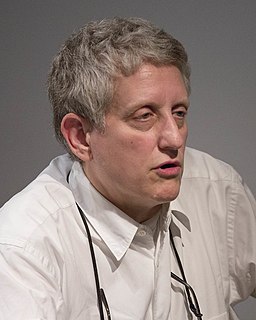A Quote by Laura Mullen
Helen Vendler calls this kind of interrogation of a work "roads not taken," suggesting that it's useful, when writing critically, to consider what differences it makes to the work or the encounter with the work if changes are made. It's one way of better understanding your experience, comparing it to other possible experiences you can imagine having.
Related Quotes
By and large a good rule for finding out is this: the kind of work God usually calls you to is the kind of work a) that you need most to do and b) the world most needs to have done. If you really get a kick out of your work, you've presumably met requirement a), but if your work is writing TV deodorant commercials, the chances are you've missed requirement b).
I can work a lot faster when I'm writing a screenplay than when I'm writing a play because, if I'm having a problem with a scene or something, I can just be writing it in a way where there's no dialogue, or find a way to make sound do the work that I want to do or a close-up do the work that I need to do.
It is possible to work across the aisle in Washington, but it's hard. And I think it's been made worse by the kind of 24-hour news cycle, the fact that everything is on TV before you can work things out quietly. I think it's the intensity of information that makes it feel more difficult to get things done. But I didn't leave with a bitter taste about the politics. The one thing that I would say is, I do think there is an unfortunate tendency to turn political differences, or policy differences, into critiques of one another's character or motives, and that's unfortunate.
I hope that if the people who read my work encounter people in the real world who are like the characters that I write about, that maybe that might make them feel empathy for those people. I know it sounds idealistic in a way, but I do hope that my work maybe changes some minds, and that my work makes readers see people as human that maybe before they read my work they might not have seen as humans, and those people include me and my family and my kids, people in my community.
I enjoy singing the songs a certain way, but I don't even know how the writing even began. To me, it's work that is kind of invisible; it's a weird kind of work to have because you're not working, but it's not not work. Formulating your thoughts and making a melody that's catchy enough for people to listen to what you're saying is really hard!
For me, writing is a job. I do not separate the work from the act of writing like two things that have nothing to do with each other. I arrange words one after another, or one in front of another, to tell a story, to say something that I consider important or useful, or at least important or useful to me.
Most of the earth's inhabitants work to get by. They work because they have to. They didn't pick this or that kind of job out of passion; the circumstances of their lives did the choosing for them. Loveless work, boring work, work valued only because others haven't got even that much, however loveless and boring - this is one of the harshest human miseries. And there's no sign that coming centuries will produce any changes for the better as far as this goes.
I can go into the wilderness and not see anyone for days and experience a kind of space that hasn't changed for tens of thousands of years. Having that experience was necessary to my perception of how photography can look at the changes humanity has brought about in the landscape. My work does become a kind of lament.
For me, writing is a job. I do not separate the work from the act of writing like two things that have nothing to do with each other. I arrange words one after another, or one in front of another, to tell a story, to say something that I consider important or useful, or at least important or useful to me. It is nothing more than this.
I understand all the work to be of a nonabstract nature regardless of the style, form, or explicit subject matter because all the work... is concerned with evoking experiences that are in themselves - and their relationship to you, the viewer - the ultimate subject and content of the work. I want to equate the experience of the work with its meaning.





































